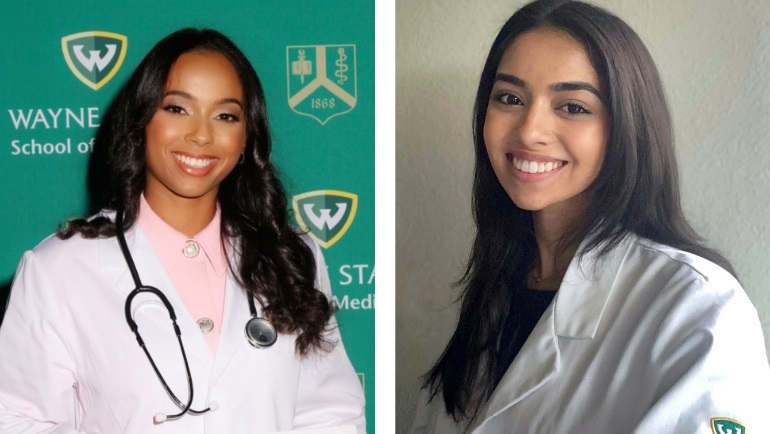
The Wayne State University School of Medicine Class of 2024 started its medical education journey solely online, inspiring an innovative class assignment on debunking medical myths that the class is still referencing as third-year medical students providing patient care in the school’s affiliated clinical rotation sites.
The School of Medicine has a strong connection to the Detroit community, due in part to its mandatory service-learning curriculum in the pre-clinical years that gets students working with patients earlier than many peer schools. Those opportunities went virtual early in the COVID-19 pandemic. To combat that, “COVID-19 Medical Myth Infographics” focused on training first-year medical students to utilize library resources while in lockdown. Students learned to search for emerging medical literature, evaluate evidence and use that evidence to create an infographic debunking COVID-19-related myths for non-medical audiences.
The module was well received by students, and highly evaluated by community members.
Infographics such as “You Should Wear a Mask,” “Do Sunshine and Hot Weather Stop the Spread of COVID-19?” and “Is Ibuprofen Safe for COVID-19?” are available for download at https://digitalcommons.wayne.edu/covidinfographics/ and can be freely remixed, reused and redistributed by the general public for the broadest possible public health impact.
A core aim of the project was teaching the ability to share findings from quality and credible sources.
“As students, being able to build a foundation in evidence-based medicine is more important now than ever. In light of social media and the wide variety of health information on the internet, medical misinformation is a serious challenge that we face today,” said medical student Narmeen Rehman. “The project allowed us to understand with an open mind where certain knowledge and beliefs can come from, as well as how to thoughtfully address misinformation when we see it.”
Rehman and classmate Rachel Monconduit, who also served as service learning representatives in their pre-clinical years, have taken the assignment one step further.
The third-year medical students teamed up with Associate Professor Emeritus of Internal Medicine Jennifer Mendez, Ph.D., and School of Medicine librarians Katherine Akers and Ella Hu to publicize the positive effect the assignment had on student education and community engagement. “Building First-Year Medical Students’ Skills in Finding, Evaluating, and Visualizing Health Information Through a ‘Debunking Medical Myths’ Curricular Module,” was published April 5 in the journal Medical Science Educator.
“As I begin the third year of my medical education, my training no longer consists of hours of learning about disease processes, diagnostic techniques and treatment modalities from a lecture or textbook. My transition into the clinical environment has provided an excellent opportunity to apply the skills I acquired from the ‘Debunking Medical Myths’ project and others to real-life medical situations,” Monconduit said. “I now work directly with patients to conduct first-contact patient interviews, explain treatment complications and options for treatment, and advise follow-up appointments. This requires good communication and counseling techniques. The project allowed me to build some of these essential techniques such as translating research evidence into clinical practice to provide safe, transparent and effective health care provision. I’ve also had the opportunity to expand upon communicating health information in plain language to meet patient/family health literacy needs.”